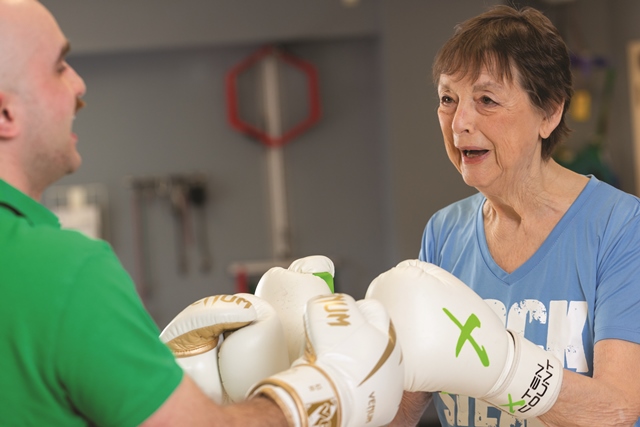By Fred DeVries
You might do a double-take when you see Diane Jamieson, 78, donning her boxing gloves to throw a double jab.
After undergoing surgery for a broken hip, Diane arrived at St. Joseph’s Health Care London’s Parkwood Institute as an inpatient to continue her rehab regime. Even though her mobility was improving, she was discouraged by her pace of recovery.
“I thought this was it. I broke my hip, I have Parkinson’s disease, and I’m not going back home. I’d have to move into long-term care when I leave Parkwood Institute,” recalls Diane.
One day, Danielle Sinclair, a physiotherapist at Parkwood Institute, noticed boxing gloves hanging from Diane’s walker. “I asked her about it,” says Danielle, “thinking it was unusual to see a patient carrying boxing gloves around.” What Danielle learned was how Diane adopted non-contact boxing as part of her fitness routine to help with Parkinson’s disease – and how much she loved to box.
That was a knockout moment for Danielle. Why not include boxing as part of Diane’s rehab program? She enlisted the help of avid boxer and St. Joseph’s volunteer Greg Overend. Together with Diane, they built a unique therapy program adding the movement, balance and coordination of boxing – all of which can build mobility and strength – into her rehab.
“Working with what patients love and connecting with their interests motivates them,” says Danielle. “And it helps to move therapy and recovery along because they are more engaged, more interested in seeing progress.”
After several weeks as an inpatient, Diane had progressed so much she moved back home – not into long-term care. A complete turnaround from what she thought would happen.
Now as an outpatient at the Geriatric Day Hospital at Parkwood Institute, Diane continues to strap on her gloves to ‘go a few rounds’ with Greg.
“The Parkwood Institute staff truly listen to what is working and not working for me,” she says. “My care isn’t based on their assumptions. They attend to my specific needs, like adding boxing to my rehab. I really appreciate how they’ve gone out of their way to make my treatment my own. We all want to have our own voice – not just in healing but in this world.”
For Danielle, seeing Diane’s progress is gratifying. “Had I not noticed and asked about her boxing gloves, I’m not sure I would have known about her love of boxing or how it would make such a big difference to her success in rehab,” says Danielle. “Listening to what matters to patients and finding the one thing that inspires them to be involved in their rehab – that can really improve their life.”
Diane agrees. “Being able to box was a great morale boost for me. It has brought me many smiles.”
Fred DeVries works as a Communication Consultant with St. Joseph’s Health Care London.


